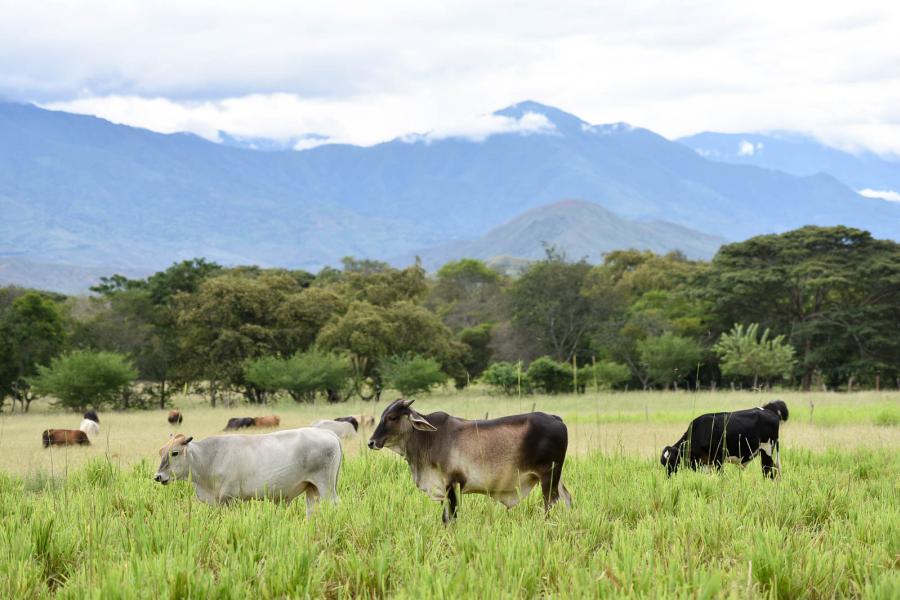Webinar: Data tools to unlock climate finance for livestock development

Dairy photo: S. Leitner (ILRI)
This webinar highlighted data tools that can help countries and projects build a case for investment in methane emissions reductions in the livestock sector.
In low-and middle-income countries, organisations working in the livestock sector are interested in accessing climate finance to support actions to reduce greenhouse gas emissions from livestock, particularly methane. A key step to reducing emissions is understanding the environmental impacts of farming. But data and tools for making these assessments are often scattered or unsuitable for use in LMIC context. Livestock sector access to climate finance remains low. Despite these challenges, solutions are available!
The webinar on harnessing data tools to unlock climate finance for methane abatement in the livestock sector was developed to help participants gain valuable insights into leveraging data tools to build the case for investment in livestock development projects.
The session was hosted by Livestock Data for Decisions (LD4D) in collaboration with the Agriculture Hub of the UNEP-convened Climate and Clean Air Coalition and the World Bank.
Watch recording
Presentations
Welcome and about the Climate and Clean Air Coalition Agriculture Hub (Watch presentation)
Dr. Gregory Kohler, Agriculture Expert, Climate & Clean Air Coalition
Greg leads the Agriculture Hub of the Climate & Clean Air Coalition, a voluntary network of governments and key stakeholders working together to reduce the sector's short-lived climate pollutant (SLCP) emissions from livestock, paddy rice cultivation, open burning of agricultural residue, and food loss and waste. He was previously an American Association for the Advancement of Science (AAAS) Science & Technology Policy Fellow with the Natural Climate Solutions division at USAID, working as a climate and land adviser. He has a PhD from UC Irvine, where he documented the decision-making process for implementing low-emissions agricultural practices, and studied how environmental policy impacts on dairy cooperatives.
About the Livestock Data for Decisions network (Watch presentation)
Ana Miranda, LD4D Development Manager, SEBI-Livestock
Ana leads the development of the LD4D Network. She is an economist with expertise in providing technical assistance to programmes targeting smallholder farming systems. She has worked as a monitoring and evaluation specialist for FAO and UNDP in different projects across Latin America and Africa. She has a MSc in Economics for Rural Development and a MA in Social Policy and Social Development from the University of Manchester. As LD4D Manager her role is to lead on the development of the network and delivery of outputs and outcomes.
LD4D Environmental Assessment Tool Navigator Demo (Watch presentation)
Dr. Frances Ryan, Researcher (Livestock and Environment), SEBI-Livestock
Frances is currently supporting SEBI-Livestock to build an evidence base, focused on the connections between livestock production and the environment. Frances has a varied environmental and biological science background. Previous work has involved researching chemicals in the environment as well as monitoring pollen. Frances has also explored the relationship between India’s mandatory corporate social responsibility spend and smallholders, who supply rice to large companies. Frances holds a PhD from the University of Edinburgh, in conjunction with Scotland’s Rural College (SRUC), where she developed a nutrient budget assessment approach for livestock and arable systems in Scotland covering a 31 year period.
Data Tools for Livestock Management (Watch presentation)
Leah Arabella Germer, Agriculture Specialist (Agriculture and Food Global Practice), World Bank Group
Leah specialises in the area of livestock and climate change and focuses on countries in Latin America and Africa. Previously Leah worked as a fellow at the U.S. Environmental Protection Agency (EPA) in Washington, DC and as a research consultant at the Tropical Agriculture Research and Higher Education Center (CATIE) in Costa Rica. She has a master’s degree in Environmental Policy from American University and is currently a PhD candidate at Wageningen University and Research with the Animal Production Systems Group.
The Case of Paraguay (Watch presentation)
Irene Wasilevsky, Senior Agriculture Economist (Latin America and Carribean), World Bank Group
Irene has expertise in capital markets, economy, finance and sustainable development, and SME financing. She is currently supporting World Bank initiatives in Argentina, Paraguay and Uruguay. She previously worked as an external consultant to international organizations in the financial system, climate financing, environmental markets, economic evaluation of projects and national sustainable financing strategies. She has an Economics degree from the University of Buenos Aires and a Master’s Degree in Finance from Torcuato Di Tella University.
The Importance of Data for Livestock Finance (Watch presentation)
Dieter Fischer, Lead for Agribusiness Advisory Services in Latin America and the Carribean, International Finance Corporation, World Bank Group
Dieter Fischer leads Agribusiness Advisory Services in Latin America and the Caribbean at the International Finance Corporation. He has 38 years of experience in agricultural development in Africa, Asia and Latin America. This includes experience in climate smart agriculture, producer organizations, agri-inputs, extension system design and results measurement. He holds a Bachelor’s Degree in Biology from Albion College and a Master’s degree from Rutgers University in Agricultural Engineering.
Q&A and Discussion (Watch recording)
Closing remarks and next steps - Gregory Kohler (CCAC) (Watch recording)
Background
Objectives
Explore the use and application of different data tools in impact assessments.
Promote the LD4D environmental assessment tools navigator.
Support and encourage knowledge exchange on the potential use of these tools in climate finance projects
Explore how tools can be further developed to assist countries.
Audience
This webinar was designed for policymakers, researchers, investment case developers, project implementers, and funders in the agriculture sector. This may include:
- Project managers looking for data on project-level environmental impacts, greenhouse gas (GHG) emissions, and emissions potential.
- National-level policymakers or analysts working in an agriculture or livestock department seeking to understand where the biggest opportunities are for reducing emissions in a country’s livestock sector.
- Anyone seeking data to develop an investment case for climate finance for livestock
- Funders seeking to understand how the livestock sector can contribute to emissions reductions

